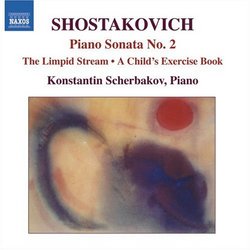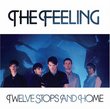| All Artists: Dmitry Shostakovich, Konstantin Scherbakov Title: Shostakovich: Piano Sonata No. 2; The Limpid Stream; A Child's Exercise Book Members Wishing: 0 Total Copies: 0 Label: Naxos Original Release Date: 1/1/2006 Re-Release Date: 9/26/2006 Genres: Special Interest, Classical Styles: Exercise, Ballets & Dances, Ballets, Chamber Music, Forms & Genres, Etudes, Short Forms, Sonatas, Historical Periods, Classical (c.1770-1830), Modern, 20th, & 21st Century, Instruments, Keyboard Number of Discs: 1 SwapaCD Credits: 1 UPC: 747313009275 |
Search - Dmitry Shostakovich, Konstantin Scherbakov :: Shostakovich: Piano Sonata No. 2; The Limpid Stream; A Child's Exercise Book
 | Dmitry Shostakovich, Konstantin Scherbakov Shostakovich: Piano Sonata No. 2; The Limpid Stream; A Child's Exercise Book Genres: Special Interest, Classical
|
Larger Image |
CD DetailsSimilar CDs
|
CD ReviewsSome of Shostakovich's Least Familiar Piano Music J Scott Morrison | Middlebury VT, USA | 09/30/2006 (5 out of 5 stars) "This is, if I recall correctly, the third in the series by pianist Konstantin Scherbakov of most of Shostakovich's solo piano music. The first was the marvelous set of Preludes and Fugues, Op. 87; the second contained the lighter-hearted 24 Preludes and the acerbic First Piano Sonata. This disc contains the almost-never-heard Second Piano Sonata plus a number of very rare pieces, some of them from Shostakovich's teens.
The three movement Second Sonata is altogether less forceful than the First, being rather more light-hearted than its hard-hitting predecessor. Its first movement is marked Allegretto but its whirling sixteenth notes make it seem faster. It has two main themes that are intertwined in the development section. The second movement is a reticent Largo made all the more so by its uncertain tonality. Its central section is even more modest, with a meandering upper voice accompanied only occasionally by simple pianissimo chords. The finale is one of Shostakovich's marvelous passacaglias, in this case with a fairly complex theme that is put through ten variations. The virtuosic Variation V is the movement's climax; after that the variations tail off to a self-effacing ending. Scherbakov plays the work elegantly and with all its subtlety intact. This sonata deserves to be better known. Three Pieces (1919-20) are among Shostakovich's earliest works -- he was only thirteen when he wrote the first of them -- and together last less than three minutes. The Minuet is Mozartian with an ingratiating melody and a modified Alberti bass. Prelude sounds almost Shostakovian harmonically. Intermezzo, never finished by Shostakovich (and brought to a satisfying finish by Scherbakov's closing chords) sounds like a child's piece, a la Grieg, but with some harmonic twists. 'A Child's Exercise Book' is from 1944-45 and was written for Shostakovich's young daughter. The simple character pieces are March, Valse, Sad Tale, Merry Tale, The Bear, Clockwork Doll, and Birthday. Some of them actually sound a little like his Op. 34 Preludes. 'Merry Tale' and 'Clockwork Doll' are the most difficult and the most interesting. 'Birthday' is notable for its repeated-note fanfares. 'Five Preludes' date from 1919-21 and were part of a set written in collaboration with two fellow students at the Moscow Conservatory. They are brief and more virtuosic than anything on this CD aside from the Sonata. No. 4 is similar to Prokofiev's Allegro barbaro with its varying meter and brutalist writing. The final set of pieces, lasting about fifteen minutes, is an arrangement for piano, made in 1934 by the composer, of music from his ballet 'The Limpid Stream,' one of his works that more or less disappeared from sight after the vicious Stalinist attack in 1936 of his opera 'Lady Macbeth of Mtsensk District.' The very first theme, a kind of music box tune, is extremely catchy. (I've not been able to get it out of my mind's ear and I keep thinking it's also been used in a commercial or in a movie, but I'm damned if I can remember where.) Another catchy section is the last one, 'Tango', which shows us that Shostakovich had been listening to American jazz. I suspect this will be the last CD of Shostakovich piano music in this series; there's really very little left to record and none of it terribly important. Although this third CD contains little of real substance beside the Sonata and possibly 'The Limpid Stream,' it is wonderful to have, particularly in Scherbakov's delightful performances. Scott Morrison" |

 Track Listings (23) - Disc #1
Track Listings (23) - Disc #1


